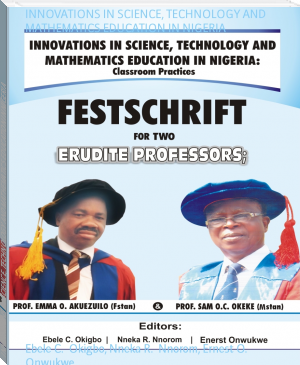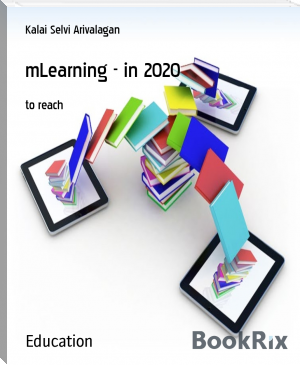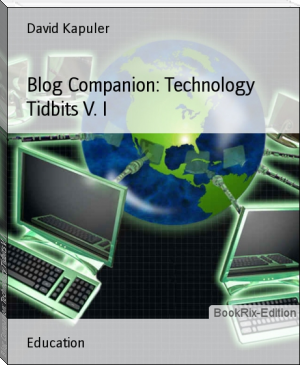INNOVATIONS IN SCIENCE, TECHNOLOGY AND MATHEMATICS EDUCATION IN NIGERIA - Ebele C. Okigbo, Nneka R. Nnorom, Ernest O. Onwukwe (best novel books to read TXT) 📗

- Author: Ebele C. Okigbo, Nneka R. Nnorom, Ernest O. Onwukwe
Book online «INNOVATIONS IN SCIENCE, TECHNOLOGY AND MATHEMATICS EDUCATION IN NIGERIA - Ebele C. Okigbo, Nneka R. Nnorom, Ernest O. Onwukwe (best novel books to read TXT) 📗». Author Ebele C. Okigbo, Nneka R. Nnorom, Ernest O. Onwukwe
Another implication of the proportion of staff in each category is such that as those in the topmost echelon gradually exit the service, as a result of length of service, more of the upcoming ones in the lower cadre would be filling up the vacant positions, having been adequately mentored and continuity would be assured in the system. It is therefore, not uncommon in tertiary educational institutions to see younger academia under the tutelage of the senior colleagues.
Strategies for Mentoring Relationships and ST Teacher Retention in Teacher Education Institutions
Adoption of team-teaching approach in course assignment
Adoption of team approach in research project supervision
Holding regular Departmental/Faculty Board meetings to discuss issues germane to the Department/Faculty.
Appointment of duty posts to all staff, more importantly to orient the new ones .
Actively Involving the Principals or Heads of Departments in schools where student-teachers undertake their teaching practice in supervising, commenting upon, and grading the work of the student-teachers.
Discussing the External Examiner’s comments in various courses at departmental /school board meetings. Through such avenue, junior colleagues are made to internalize the rudiments of the job.
Encouraging joint authorship of publications particularly with senior colleagues.
Encouraging regular attendance and active participation in conferences and workshops.
Regular academic for a where issues bordering on career prospects/guidance are discussed.
Conclusion and Recommendations:
It is worthwhile to celebrate accomplished academics. Events such as this calls for sober reflection both on the part of accomplished academics including the Celebrants and those still in active service. Just as all parents would wish to have successful offspring, so also every accomplished academic should take a hindsight at the number of up-coming academics he/she has mentored and is mentoring. By so doing life-links are being established. In this way, every mentoring relationship is an effort at ensuring retention of the mentee in the career and sustainability of human- power in that particular career sector. ST education sector is in dire need of such mentoring relationships as an avenue of forestalling paucity of ST teachers in TEIs.
In view of the foregoing, it is therefore, recommended that mentoring relationships should be encouraged in all TEIs as an avenue of encouraging quality science and technology teacher retention in the discipline. Senior academics should make it a point of duty to provide quality leadership roles for the up-coming colleagues to emulate. This category of academics are usually in short-supply in every TEI, hence, it is expected that one of their major roles is to mould the younger minds and serve as role models.
References
Ezekannagha, G.N. (2018). Teaching Science, Technology, Engineering and mathematics (STEM), for Self-Reliance in Nigeria: Challenges and Strategies. In Njoku, Z.C, Nzewi, U.M. & Nnaka, C.V. (Eds.). Perspectives on Science and Technology Education in Nigeria. Nsukka: Great AP Express Publishers Limited.
FGP (2015). hisegrowthpartners.com/mentoring, Retrieved4/8/16.
National Open University of Nigeria (NOUN, 2004). History and Philosophy of Science. Lagos: NOUN
National Universities Commission (2007). Benchmark and Minimum Academic Standards-Education
Njoku, Z.C. (2018). African Regional Development Through the Lens of Quality Science and Technology Education.. In Njoku, Z.C., Nzewi, U.M. & Nnaka, C.V. (Eds.) Perspectives on Science and Technology Education in Nigeria. Nsukka: Great AP Express Publishers Limited
The New Encyclopaedia Britannica (1995). The History of Science.27, 32-42. www. Management-mentors.com. Effective Mentoring Skills. Retrieved 25thNovember, 2017.
INFLUENCE OF MENTORING ON THE ACADEMIC PERFORMANCE OF BIOLOGY STUDENTS IN FEDERAL COLLEGE OF EDUCATION (TECHNICAL), UMUNZE
Jacintha N. Ugbaja
&
Dr. Roseline N. Egbunonu
Abstract
The study was to find out the influence of mentoring on the academic performance of biology students in Federal College of Education (Technical), Umunze. Three research questions and one hypothesis guided the study. Descriptive survey research design was adopted. The population of the study was 190 degree biology students. Purposive sampling technique was used to select 148 students from the population. The instrument for data collection was a self- structured questionnaire titled influence of mentoring on the academic performance of biology students. The instrument was validated by three experts. The data collected were analysed using mean and standard deviation, while t-test was used to test the hypothesis at 0.05 alpha level. The findings of the study showed that mentoring has positive influence on the academic performance of students, the respondents agreed on problems associated with mentoring and the solutions to the problems associated with it. There is no significant difference between the mean responses of male and female biology students on the problems associated with mentoring on their academic performance. The implication of the study is that since mentoring has positive influence on the academic performance, students should engage in mentoring so as to improve their academic performance. Finally the study recommended amongst that; planned and monitored mentoring should be adopted by the faculty heads of the institution to ensure that right life values are fostered in the mentees and seminars, conferences and workshops should be conducted to create awareness on the need for mentoring.
Keywords: Mentoring, Academic performance
Introduction
Education contributes to the development of creative products and the enrichment of scientific and cultural knowledge. It also gives individuals the tools they need to participate in social and economic life (Organization for Economic Co-operation and Development, 2010).In the words of Barrack Obama, former president of the United States (2009), education is no longer just a pathway to opportunity and success but it is a prerequisite.
Today, students need to be highly skilled, informed and worthy in character and learning to meet the complexities and challenges of the immediate environment and work place. Students are anticipated to be ready for work when they enter into the labor market, students encounter numerous problems in the transition from college life to the world at large which includes: high cost of education, by making college unaffordable and student loans unbearable we risk deterring our best and brightest from pursuing higher education and securing a good paying job (Pocan. 2013). Decline in the quality of education; we have a responsibility to ensure that every individual has the opportunity to receive a high quality education, from prekindergarten to elementary and secondary, to special education to technical and higher education and beyond (Jeffords, 2001) and other socio-economic factors that poses a treat for the student during their transition, as are port by World Bank (2005) states that, education is a fundamental factor in socio-economic and political development as it inculcates skills and knowledge in students, preparing them to take up roles in the national development and higher purpose.
To enhance effectiveness of biology students in facing all environmental issues, the college and the societal factor, students look for the last resort (mentoring) which can be used as an effective tool for their professional development which involves the students looking for a more knowledgeable person or older person for mentoring. Mentoring is a relationship in which a more experienced or more knowledgeable person (teacher-student) helps to guide a less experienced or less knowledgeable person who wants to learn (Wikipedia 2010). Mentoring has been described as a formalized process in which a more experienced individual play a supportive role of supervisor, motivator for learning with a less experienced and knowledgeable to facilitate personal and professional progress, (Roberts, 2000). Mentoring is a process of faculty-student (peer-peer) interactions for sharing and advising which has positive effect on student self-efficacy also (Vogt, 2008). Mentoring is to support and encourage people to manage their own learning in order that they may minimize their potential, develop their skills, improve their performance and become the person they want to be (Eric, 2000).Santos and Reigados, (2002) found that greater frequency of contact leads to higher level of self-efficacy.
In this study, mentoring the word mentee or protégés and mentor are commonly used within a statement. Mentee or protégés: is one who receives guidance or coaching from a more experienced person (Ravitch, 2007). Ravitch added that mentor: is a trusted counselor or guide who tutors or coaches a new comer or novice.
Mentoring the students has positive and negative impact on the personal and professional growth of youth. Mentor can play a significant role through providing information, direction, inspiration and guiding them in the process of effective transition such as- Providing emotional and other forms of health related support to the protégé (mentee) by listening offering advice during times of stress or provide counseling on personal or academic related issues (Kram, 2005), Enhances interpersonal relationship with parents, siblings and peers (Rhodes, 2002), etc. On the other hand mentoring can also have negative outcomes like: Some mentors divert their jobs of being a mentor into sexual abuse of their mentees. When a mentor is suddenly absent or non-available at a particular time the mentee seeks his/her mentor’s advice, the mentees’ self-esteem will be reduced due to the sudden absence of the mentor. Mentoring of students may be used as a strategy in college to make them feel associated and involved on campus and leads to improvement in their career as well as academic results (Pascarella, Pierson, Wolniak & Terezil, 2003). It may offer emotional and instrumental support to achieve the goal (positive) or ends up not getting to the goal (negative). It also helps students to cope with unstable personal situations and make them understand the outside world (Rauner etal, 2000).
Mentoring delivers career, social and emotional support for self-exploration which leads to academic and personal outcomes for students (Crisp & Cruz, 2009 and Johnson, 2006) and guide them to become a successful professional (Schlosse, Knox, Moskovite & Hill, 2003). In seeking a mentor, either formal or informally you should think about exactly what you want out of the relationship, are you looking for someone to provide you with general guidance about the profession or are you seeking someone who is willing to read your work and talk about academics? Are you in year one and needs someone to talk to? Knowing what you want out of the relationship will help you to identify the right person for the job.
Mentoring can be viewed in various ways or forms which include- Peer mentoring, Youth mentoring, Academic mentoring and Work place mentoring and so on. The one that is relevant to this work is academic mentoring which is the type of mentoring in education where a faculty member imparts knowledge, provides support and offers guidance to a student protege on academic as well as non-academic issues (Jacob, 2001). This type of mentoring may facilitate psychological adjustment and foster a sense of professional identity (Austin 2007).
Mentoring has been a prevalent area of research in the field of business, education and psychology for the past several decades (Crisp & Cruz 2009).Research has shown the significant benefits of mentoring in the organizations as noted by Tinto (2003) and Sum, Park and Chunks (2010). On the other hand, Olu-Ajayi (2008) identified problems such as imbibe planned and monitored mentoring, inculcation of role of a mentor to the mentee and possible solutions like some mentors divert their jobs of being a mentor into sexual molestations of their mentee, mentors use mentoring as a means of extorting money from their mentees. Soit is logical to accept that it also benefits students in biology as the problem of this study is what is the influence of mentoring on the academic performance of biology students of Federal College of Education (T), Umunze?
Purpose of the Study
The purpose of





Comments (0)